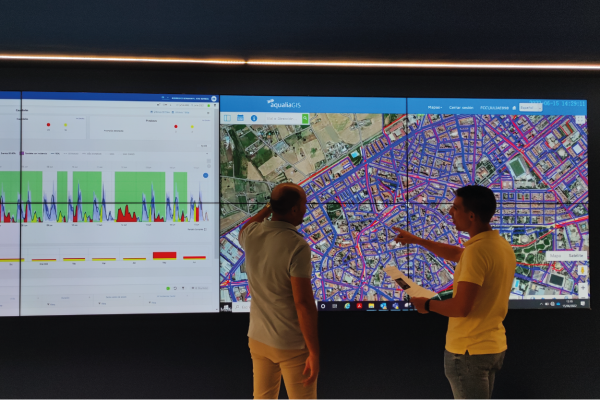Efficient water management, a roadmap to a sustainable future
- On World Water Day, which is celebrated tomorrow, March 22, the United Nations is calling on governments to work four times faster to meet the goals of clean water and sanitation for all.
- In the current scenario, specialized companies play a key role in their commitment to efficiency through technology and innovation.
- In the last year, Aqualia invested close to 17 million euros in technology and has launched six new R&D projects, as well as making progress on a dozen other ongoing research projects.

On this year's World Water Day, the United Nations is making a global call to "Accelerate Change" and is calling on governments, companies, and citizens to take the necessary steps in the way they manage and consume water. The latest data, warns the UN, shows that governments must work four times faster than they have been doing so far to meet Sustainable Development Goal (SDG) 6: "Clean Water and Sanitation" on time.
Although significant achievements have been made in recent years, the UN says there are still 2 billion people worldwide without access to safely managed drinking water services and estimates that by 2025 two-thirds of the world's population could be living in water-scarce areas. In this scenario, companies specializing in integrated water cycle management have a key role to play, being able to research and innovate to put water resources at the forefront of sustainability and human health care. The investments in R&D&I made by Aqualia have an impact in this regard and have allowed, throughout 2022, six new projects to be launched, progress to be made in the development of another twelve research projects and four to be concluded.
Innovation and digital transformation in the face of future challenges
During 2022, Aqualia's investment in technology was close to 17 million euros. In Spain, the company's objective is to improve efficiency and sustainability in water management and, to this end, it is focused on developing and improving water technologies. The company is implementing a network of nine technology and control centers in Spain, where it centralizes network management, mapping, the launching of work orders, and warehouse control, among other activities.
The main tool in this technological process is Aqualia Live, a modular and integrated platform around which all the company's digital services are concentrated and which aims to interconnect the millions of data it manages every day in order to make more efficient decisions. In the case of Dénia (Alicante), the installation of 50,000 sensors along the 500 kilometers of the supply network will improve management, increase efficiency, reduce losses in the supply networks and advance in meeting the environmental objectives set.
To face the challenges of the technological era, climate change and water stress, the main contribution of companies is innovation and investment capacity. Through these bridges, companies can accelerate change and improve the efficiency of the integral urban water cycle, since new technologies are an essential ally for the water sector.
A clear example is the Lleida wastewater treatment plant, where Aqualia has implemented various actions to improve the efficiency of sludge treatment, which will increase the production of biogas, both for use in cogeneration and as a vehicle biofuel. In addition, with the installation of 705 photovoltaic panels, the plant has already achieved 50% energy self-sufficiency, making it one of the most sustainable wastewater treatment plants in Spain.
On the other hand, Aqualia has managed to reduce the water consumed by the city of Almería by half in the last 30 years, from 30 cubic hectometres per year in 1993 to 16 cubic hectometres at present. All this despite the fact that the city has increased its population by 30%. This increase in efficiency has been achieved thanks to the sectorization of the water network, the implementation of leak detection systems and the development of public awareness campaigns.
In the Balearic Islands, the implementation during the last two years of new technologies for the search of leaks, together with the sectorization of the municipal water network, have allowed reaching very high yields, above the objective defined in the Hydrological Plan of the Balearic Islands for 2027 and even surpassing the national average. In Sant Joan, for example, 91.36% has been reached; and in Formentera, 92% has been reached. In Santa Eulària, unregistered water has been reduced by 20% compared to the previous year, which means a saving of 300,000 m3. The use of desalinated water has also made it possible to stop extracting 1.3 million cubic meters from the aquifers.
For Aqualia, the first company in the sector to be certified by AENOR in the achievement of the SDGs, water is fundamental for sustainable development. The United Nations declared the period 2018-2028 as the International Decade for Action "Water for Sustainable Development". In this way, society has a framework for action to accelerate compliance with SDG 6 "Clean Water and Sanitation" and its respective targets, joining efforts to address the challenges related to water and the rest of the goals of the 2030 Agenda.



